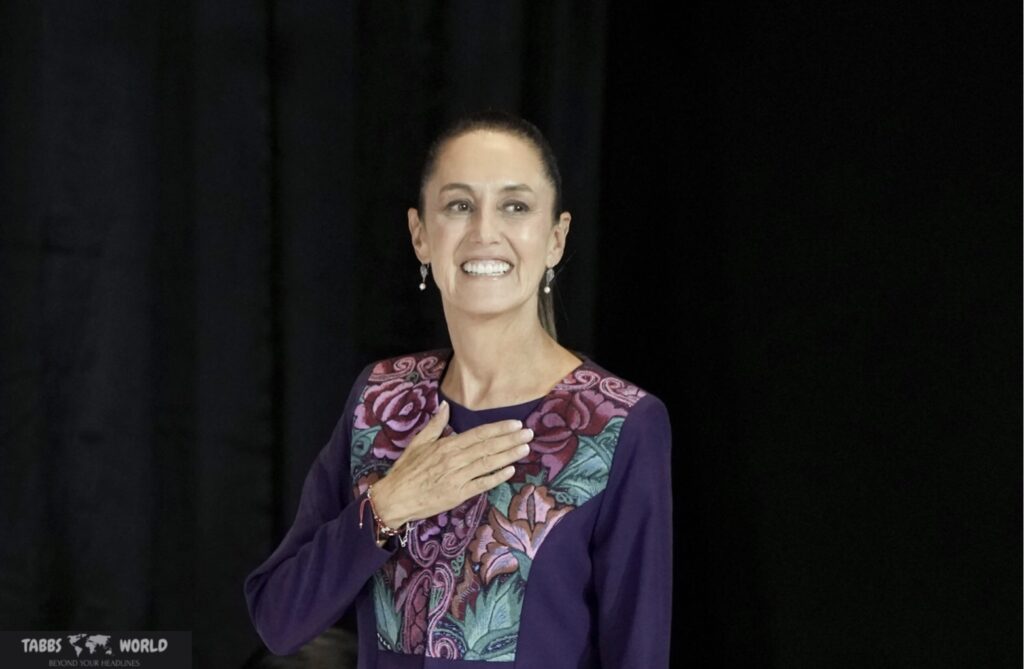Mexico elected Claudia Sheinbaum as its first female president

Claudia Sheinbaum’s historic triumph:
Claudia Sheinbaum has made history as the presumptive winner of Mexico’s presidential election, becoming the first woman in the country’s 200-year history to hold the office. Speaking at a city hotel shortly after election officials announced his irreversible lead, Sheinbaum expressed his gratitude and pride. “I will be the first female president of Mexico,” she announced with a smile. “I don’t make it alone. We all made it with our heroines who gave us our homeland, with our mothers, our daughters and our granddaughters.”

A democratic milestone:
“We have proven that Mexico is a democratic country with peaceful elections,” Sheinbaum said, stressing the importance of a peaceful electoral process. The president of the National Electoral Institute announced that Sheinbaum won between 58.3% and 60.7% of the vote, according to statistical models. In contrast, the opposition candidate Xóchitl Gálvez received between 26.6% and 28.6% of the vote, and Jorge Álvarez Máynez received between 9.9% and 10.8% of the vote.
Competitors concede:
Shein Baum, an environmental scientist and former mayor of Mexico City, reported that his rivals have demanded recognition. The official preliminary count has Galvez 28 points ahead with nearly 50 percent of polling places reporting. The election was particularly notable because it marked the first time that two of Mexico’s main rivals were women, ensuring a historic result regardless of the winner.
Breaking down religious barriers:
In addition to being the first female president, Sheinbaum will also be the first person of Jewish background to lead a predominantly Catholic country. She is scheduled to begin her six-year term on October 1, as Mexico’s constitution prohibits re-election.
Political Continuity and Change:
Scheinbaum’s victory marks the continuation of a political movement started by his mentor, President Andrés Manuel López Obrador (AMLO). Sheinbaum, along with AMLO’s policies, has expressed her belief in the government’s role in addressing economic inequality and providing a strong social safety net. Despite a spirited challenge from Gálvez, Sheinbaum led the campaign from start to finish.
Events and Challenges:
After the announcement by election officials, AMLO congratulated Sheinbaum, acknowledging her significant achievement. “She’s going to be the first [female] president of Mexico in 200 years,” he said. Although Sheinbaum’s victory did not spark the same public celebration as AMLO’s 2018 victory, the excitement among his supporters was palpable.
Public response:
In Mexico City’s historic Zocalo Plaza, Scheinbaum addressed his supporters, promising not to let them down. “I promise I won’t let you down,” she said. Also in the crowd was Sara Rios, a retired literature professor who celebrated Galvez’s concession and hoped for progress under Scheinbaum’s leadership.
Future expectations:
Supporters such as Fernando Fernández, a chef, acknowledged the challenges ahead, particularly in areas where AMLO’s administration had struggled, such as crime and drug trafficking. “You vote without conviction for Claudia, for AMLO,” Fernandez said, hoping Scheinbaum can improve on AMLO’s flaws.
Opposition and criticism:
Galloway, a tech entrepreneur and former senator, has campaigned for a more aggressive approach to organized crime. In his concession speech, he emphasized the need for results and solutions to Mexico’s dire problems, reflecting the high stakes and polarized opinion among voters.
Voter Turnout and Electoral Constituency:
About 100 million people registered to vote, with turnout seen at around 60 percent, consistent with previous elections. In addition to the presidency, voters were also electing governors in nine of the country’s 32 states and filling several local positions, one of the largest elections in Mexican history.
Referendum on López Obrador:
The election was widely seen as a referendum on López Obrador, who expanded social programs but largely failed to reduce cartel violence. His Morena party currently holds the governorship and a majority of seats in both houses of Congress. Sheinbaum has promised to continue AMLO’s policies, including a universal pension for the elderly and apprenticeship programs for youth.
Persistent problems:
Despite AMLO’s claims to have reduced the homicide rate by 20% since taking office, the actual reduction appears to be closer to 4%. Ongoing cartel violence and economic challenges remain key concerns for many voters, highlighting deep divisions in public opinion regarding the direction of the country.
Personal stories and local perspectives:
Voters expressed their hopes and fears in different neighborhoods of Mexico City. Stefania Navarrete, a housewife, supported Sheinbaum despite reservations about AMLO’s term, stressing the importance of addressing security issues and social programs. Others, like Julio Garcia, expressed a desire for change, citing personal experiences with crime and the need for new leadership.
conclusion:
As Mexico prepares for a Scheinbaum presidency, the nation stands at a crossroads, with high expectations to resolve long-standing problems and continue the progress made under AMLO’s administration. The historic election of Claudia Scheinbaum marks a new chapter in Mexico’s political landscape, with a promise of continued reform and a commitment to democratic values.



